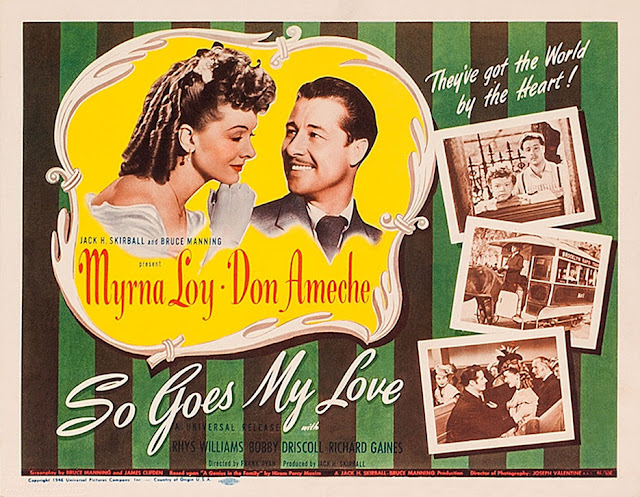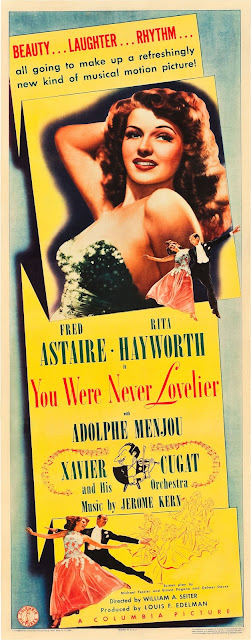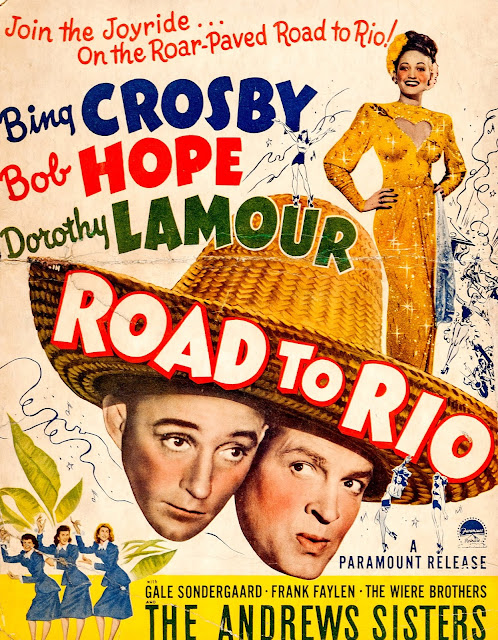Loy and Ameche are precious in... So Goes My Love (1946)
When you're a classic film fan, there is always that fear that you'll no longer find new favorites. It's irrational, we know, but there were only so many old movies made and when you devour as many as you can week after week, you start to wonder if all of those precious "new" discoveries are behind you. Will you ever watch another film that will inspire you to watch it countless times like you have with Bringing Up Baby or Bathing Beauty? It was during one of these ruts when I came upon So Goes My Love, a charming comedy that made my heart flutter instantly just because it starred two of my absolute favorites, Don Ameche and Myrna Loy.
Based on A Genius in the Family, the memoir of Hiram Percy Maxim, So Goes My Love concentrates on his parents, Jane Budden and inventor Hiram Stevens Maxim. Maxim (the father) created the Maxim Gun, the first fully automatic, portable machine gun. He held patents on steam pumps, mousetraps, and curling irons, and he dabbled in large aircraft designs. He also invented the first automatic fire sprinkler, which extinguished the fire in addition to reporting it to the fire station. Interestingly, Maxim claimed to have invented the lightbulb and battled Thomas Edison frequently over the patent. Maxim believed that Edison's superior knowledge of patenting law allowed him to outmaneuver Maxim. He claimed that a former employee had screwed up when filing the patent and Edison took advantage of it. The invention became public property and Edison could produce the lightbulb without crediting Maxim.
Hiram Percy, the son, followed in his father's footsteps. He invented the Maxim Silencer for firearms and gasoline engines, held patents on various motor vehicle ideas, and in 1914 he co-founded the American Radio Relay League, a non-profit organization of amateur radio enthusiasts in the U.S. that still exists. The ARRL was initially created to help relay messages via amateur radio, which enabled the messages to travel further than any single station could handle. Maxim published A Genius in the Family in 1936, the second of three books he would write. The memoir was comprised of roughly sixty stories about Maxim and his father throughout his youth.
This structure is what makes So Goes My Love a true oddity. The film isn't your standard biopic. There are no sudden moments of inspiration. We don't really see how Hiram Stevens Maxim came up with his inventions. There is no real villain, no sneering competitor. Maxim isn't some tortured genius or someone who has to hit rock bottom before he can become a Great Man.
Instead, Maxim (Ameche) is an eccentric who finds himself in an unusual courtship with Jane Budden (Loy), a pig farmer's daughter who has her sights set on finding a rich husband. The film is episodic, with almost every scene illustrating one story in the Maxims' lives in the late 1800s. So Goes My Love was made during a particularly nostalgic time in Hollywood, perhaps thanks to the massive success of Meet Me in St. Louis (1944). Universal certainly didn't skimp on the period details for SGML. Myrna Loy's costumes are divine, for one thing. She actually wears a few of her dresses more than once, which may have been Universal saving money, but I think it actually gives the movie some verisimilitude -- after all, people don't wear a new outfit every day in real life!
The sets are sumptuous and jaw-dropping, too. Some of them are actually pretty famous! Universal built the house facades on Stage 12 for this film, but in 1950 two of them were moved to Colonial Street, the studio's new backlot set. One of the facades, the home of Jane's cousins the Allisons, became the Dowds' house in Harvey (1950) and was also used in The Ghost and Mr. Chicken (1966). The other facade, originally Hiram's boarding house, became the iconic home of the Munsters. In the 2000s, when production on the TV show Desperate Housewives started, Colonial Street was renamed Wisteria Lane, placing the "Harvey House" at 4349 Wisteria Lane and the "Munster House" at 4351 Wisteria Lane.
The "Munster House:"
The "Harvey House:"
A set photo showing both homes:
One of the best descriptions I've read of So Goes My Love is "domestic comedy." The film is very much grounded in its characters and their situations. Right away we understand who these people are. When we first meet Jane, she is selling the rest of her pigs and hopping a carriage to bustling Brooklyn. We can tell she is savvy by the way she correctly calculates how much her pigs are worth, and her motivations are clearly stated as she talks about finding a rich husband. She hates pig farming and she is dying to be somewhere new and exciting with someone who can take care of her.
She discovers that someone sooner than she realizes when the trolley she is taking to her cousins' house is boarded by Hiram. Right away we see he is a bit odd -- when the trolley stops in front of a wedding, Hiram jumps off, joins the party in throwing rice at the newlyweds, and then jumps right back on to the trolley. "You must be very fond of weddings, sir," a passenger notes. "No, I just like throwing stuff," Hiram deadpans.
Jane is a bit unconventional herself. When she announces to all of her cousin Garnet's friends her desire of landing a wealthy husband, they're scandalized. How could a woman be so frank
about such a thing? One of the horrified women, Mrs. Meade (Clara Blandick), tells her boarder Hiram all about Jane's intentions. The next day, Hiram goes next door to call on Jane, even bringing flowers. Although it appears he wants to court her, Hiram actually just wants to give her a heads-up: "If you're looking for a substantial husband, don't count on me." You can bet that those flowers go flying.
The next time Jane sees Hiram, she is trying on a glorious new gown when she spots him watching her from his window... wearing a wig. It's pretty hilarious seeing Ameche with long,
curly, blonde hair. When Mrs. Meade gasps at the sight, Hiram explains that he is working on a hair-curling iron and he was testing it on the wig. A few minutes later, we see smoke coming out of the boarding house and the fire brigade quickly shows up. Outside, there is all sorts of frenzy as the firemen run around and a crowd gathers. Even Jane watches from her balcony. Inside the house, though, Hiram calmly realizes that one of his inventions is smoking and he takes it from room to room, unaware that the firemen are trying to keep up with him. Once Hiram makes it outside and has a good laugh about the situation, the unamused firemen douse him with water, earning them a round of applause
from Jane.
Before long, Jane has found her future husband in Josephus Ford (Richard Gaines), an unbelievably dull but influential man. At their engagement party, Jane learns that Josephus wants her to sign a marriage contract. "That precious brow tells me you're thinking and women shouldn't think when they have men to do it for them," the jerk remarks. Jane is then told that her betrothed just bought a large interest in a pork packing plant -- and she thought she was going to escape pigs forever! Out on the terrace, Jane and Hiram are having another one of their contentious conversations. He thinks Josephus is a boor; she thinks he's just jealous he will never be as rich and important as her fiancé. Hiram concedes that
there isn't a fortune in his future:
Hiram: "All my poor wife will get is being at the start of the race, and she'll have to help me. I'll need her, need her strength when I am weak, need her love when I am defeated, need her laughter to match my own. Sometimes I'll need her tears."
Jane: "Why her tears?"
Hiram: "Well, we'll fight, we'll cry, and we'll make up. Can't make up unless there are tears to kiss away, so I'll need her tears. And she'll probably always want things you'll never be able to give her. What she gets will be what we together will be able to find in
life."
Stunned by the tenderness of this speech, Jane finally realizes that Josephus is not the man for her. She runs after Hiram and asks him to marry her, a proposal he happily accepts. While they hug and kiss each other, Josephus finds them. I love the camerawork here. As Josephus drones on about how Jane is missing out, the camera moves back from a medium close-up on him, revealing Jane and Hiram passionately kissing and ignoring him.
We next cut to the wedding, where the couple shares another long kiss. Everyone in the church appears uncomfortable about it... and then the minister actually begins the ceremony. He hadn't even gotten to the "you may now kiss the bride" part! On a side note, it kind of surprises me how lengthy these two kisses were allowed to be. After all, this is the same year that Hitchcock had to sidestep the three-second rule, thus creating that infamous scene in Notorious. Curious, isn't it?
Anyway, the film jumps ahead to the Maxims in their new home. Taking a page out of Nora Charles's book, Jane tries to tell Hiram she is pregnant with their son Percy by nonchalantly holding a pair of knitted booties. Hiram is having trouble writing a speech, though, and the news doesn't sink in until that night when he is giving the speech. It's a really sweet scene, one that is echoed later in the film when Jane tells her husband she is expecting for a second time. She asks Hiram if he remembers the speech and as he begins reciting it, he looks over at her to see she is once again holding a pair of booties.
One of my other favorite moments is when Jane reminds Hiram that not everyone can break from convention like he does, especially during this time when propriety was everything. She then decides to play a little joke by having him walk in on her smoking a cigar, something that was definitely unladylike. Loy is fantastic to watch as she tries to handle the cigar and the match. Unfortunately for Jane, Hiram's reaction isn't what she hoped for. Instead of being shocked, he comments on how much he likes her dress -- and then he introduces her to the ladies of the Purity Committee that came to call on her!
So Goes My Love is at its best when it embraces its whimsicality. That may be why the ending is a bit of a jolt. While chasing after Percy's dog, a pregnant Jane moves one of the couches, a strain that proves too much. She becomes bedridden, with her life and the baby's hanging in the balance. Poor little Percy blames himself, providing the movie with some of its most heartwrenching moments, such as when Percy says to his father "You're not mad at me? I am. I'm mad at me." And then, almost as suddenly as the tragedy happens, Jane has the baby and recovers, the film ending with everyone sitting for a family portrait.
Despite this sudden tone shift, the movie really is an excellent, underseen gem. Child actor Bobby Driscoll is so adorable, and he does so well in the role of Percy. Driscoll was quite the prolific child star, with amazing work in The Window (1949), The Happy Time (1952), and many Disney films, including Peter Pan (1953), where he served as the model and the voice for the titular character. Sadly, Driscoll's career didn't continue its momentum once he hit puberty and Disney cancelled his contract. He later remarked about his career "I was carried on a silver platter -- and then dumped into the garbage." The actor turned to drug abuse and died just weeks after turning 31.
In other upsetting news, the real Hiram Maxim and Jane Budden didn't stay married. In 1881, he married his secretary and mistress, although it isn't clear if Maxim was legally divorced from Jane at the time. Not going to lie, I was pretty disappointed to discover this. Loy and Ameche just do such a lovely job in playing these characters and bringing their love story to life. As I noted in my review of The Story of Alexander Graham Bell, Ameche was often put in biopics after the success of that 1939 film. I always think the actor did a stellar job, especially when it came to playing oddballs. When I see that mischievous twinkle in Ameche's eye, I know I'm in for a good time.
As for Myrna Loy, she is downright luminous in So Goes My Love. Like she did with all of her characters, she makes Jane into a flesh-and-blood character. You're probably thinking "Well, yeah, she was playing a real person," but biopics are frequently guilty of turning characters (particularly female ones) into cardboard cutouts. In frame after frame, Loy practically glows -- and you should see the intricate hairstyles they gave her! It sounds silly to say it, but it's almost worth the price of admission just to see what they do to Loy's hair.
So Goes My Love was an important film for Ameche and Loy because it came at a time when both of them had left their home studios (Ameche came from Fox and Loy came from MGM). The two actors work beautifully together, making it a shame that this was their only collaboration. Since they were both such idiosyncratic performers, it is great fun to see them together.
There really is one more person I must discuss, and that is director Frank Ryan. You'd be forgiven if you're not familiar with him. I honestly thought this movie had been directed by H.C. Potter or Norman Taurog until I double-checked my notes. Ryan doesn't have an extensive filmography, but he has worked in different capacities on some interesting movies, such as My Favorite Spy (1942), Made for Each Other (1939), and A Girl, a Guy, and a Gob (1941). As far as I can tell, So Goes My Love was Ryan's fifth and last directorial effort, which is a pity. He adds so many humorous touches through his camerawork, helping the film to become as light and airy as it is. There are several witty choices he makes that keep the movie from being standard fare.
For example, when Jane captures the attention of the firefighters after clapping at their hosing of Hiram, she drops her handkerchief, causing them all to clamor for it. The film then cuts to the firemen's helmets stacked on a table in Jane's parlor. We hear her and the men laughing and talking while we watch the maid happily prepare a tray of drinks. Ryan has told us all we need to know without showing us an inane shot of Jane surrounded by the men.
In another scene, Hiram is telling Jane that she shouldn't hope on marrying Josephus. With a smug look on her face, she asks Hiram to look over a batch of invitations she just ordered and he is shocked to find that they are announcements of her engagement party. The camera gives us his reaction, shows us the invitation, and then it irises in on the information about the party only to replace the image with the next shot as it irises back out.
So Goes My Love may be the quirkiest biopic classic Hollywood ever produced. With its anecdotal nature, phenomenal leads, smart direction, and exquisite costumes and sets, this is a film that deserves to be watched and watched often. Clocking in at a slim 88 minutes, you'll start to wish that every biopic was as simultaneously fun, heartwarming, and gorgeous as this one.
__________________
This is my second entry to the marvelous Bill and Myrna New Year's Blogathon, hosted by The Flapper Dame and Phyllis Loves Classic Movies. You can read the other tributes to this iconic screen duo here!
If you'd like to read more on my thoughts of Ms. Loy, check out this article I wrote for A Place for Film, the blog I edit for Indiana University Cinema.
If you'd like to read more on my thoughts of Ms. Loy, check out this article I wrote for A Place for Film, the blog I edit for Indiana University Cinema.


























































































I adore this film so much. It's cute and quirky and I love the interaction between Don Ameche and Myrna Loy. It's a shame they didn't make more films together.
ReplyDeleteI would have loved to have seen another Ameche/Loy collaboration. At least their one film together is pretty great! Thanks for reading!
DeleteAww I love Don Ameche and naturally Myrna- I will have to check this one out! Thanks so much for writing not One but TWO entries!! Emily
ReplyDeleteIt was my pleasure! I have a feeling you'll enjoy this film a lot!
DeleteI'm constantly afraid that I'll run out of new favorites - bit now you showed me a film I haven't heard about! I LOVE Don Ameche and also Myrna Loy, so I imagine I'll enjoy watching So Goes my Love. Thanks for the tip - and ofr the comment on my post!
ReplyDeleteKisses!
Ameche and Loy are just joyous to watch. I'm so glad I could provide you with a potential new favorite! Thanks for reading!
Delete